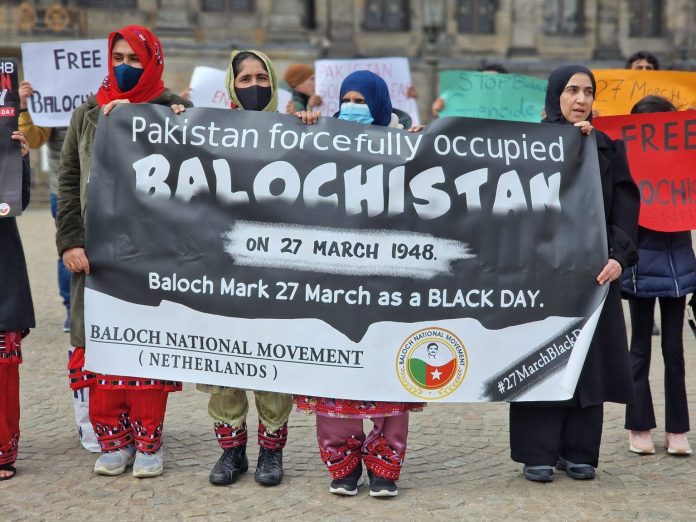On March 27, the Baloch community worldwide observed Black Day, during which the Baloch National Movement in the Amsterdam in Netherlands called for global attention to the Baloch genocide and plight. They also organized a protest rally in Manchester in UK and Berlin in Germany, with protesters holding placards and banners, denouncing the forced occupation of Balochistan by the Pakistan Army.
Highlighting their struggle, protesters emphasised how Pakistan Army annexed Balochistan on March 27, 1948.
On X, Islam Murad Baloch, a member of Baloch National Movement said, “The international community must intervene in Balochistan against the violations of Baloch human rights. The human rights defenders and UN must put sanctions on Pakistan for the violations of Baloch rights. Pakistan must to leave Balochistan.”
Baloch Black Day
Balochistan has never been a part of Pakistan; it was forcefully occupied on March 27, 1948. Since then, the Baloch nation has resisted the invasion and exploitation of their homeland. Pakistan’s most resource-rich underdeveloped region has been under the oppressive Pak Army for many decades, it has continued to committing numerous atrocities, such as abduction, murder, and torture, instilling fear among the populace.
Furthermore, Baloch activists are circulating a petition, urging international authorities to intervene in the ongoing genocide of their community members. They demand that the United Nations and human rights organizations hold the responsible parties accountable for the crimes committed in Pak-occupied-Balochistan. Additionally, they call for a fact-finding mission led by the United Nations Working Group to investigate the situation.
Speakers at the gathering reaffirmed their unwavering dedication to the cause, echoing Dr. Allah Nizar’s sentiment that the Baloch struggle for independence will continue until justice prevails. They highlighted March 27, 1948, as a sorrowful day in Baloch history, marking 75 years of resistance against oppression.
Resource Rich, People Poor
In 1958, Pakistan military officer Tikka Khan brutally suppressed the first nationalist movement, earning the infamous moniker “Butcher of Balochistan.” Despite its vast mineral wealth including oil, gas, copper, and gold, Balochistan remains one of Pakistan’s poorest regions despite being its largest province.
Today, these resources are exploited by the Pakistan Army, often in collaboration with China through the Belt and Road Initiative (BRI), a scheme vehemently opposed by armed Baloch freedom fighters.

